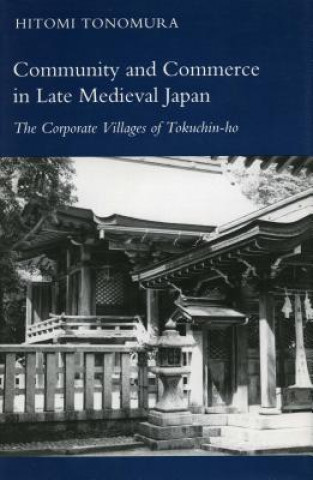
Kód: 04716073
Community and Commerce in Late Medieval Japan
Autor Hitomi Tonomura
Late medieval Japan witnessed a growth in the power of the commoner, as seen in the spread of corporate villages "(so)" marked by collective ownership and administration and other self-governing features. This study of a community ... celý popis
- Jazyk:
 Angličtina
Angličtina - Väzba: Pevná
- Počet strán: 300
Nakladateľ: Stanford University Press, 1992
- Viac informácií o knihe

98.72 €

Skladom u dodávateľa v malom množstve
Odosielame za 10 - 14 dní
Potrebujete viac kusov?Ak máte záujem o viac kusov, preverte, prosím, najprv dostupnosť titulu na našej zákazníckej podpore.
Pridať medzi želanie
Mohlo by sa vám tiež páčiť
-

De novo Molecular Design
214 € -

Charles Butler's Principles of Musick (1636)
206.95 € -

EAA 145: Bacton to King's Lynn Gas Pipeline, Volume 1
59.37 € -

Dawn of the French Renaissance
66.42 € -

Cells: The Building Blocks of Life
67.95 € -

Ancient and Holy Wells of Dublin
23.19 € -4 % -

Decameron, Italienisch-Deutsch
11.33 € -1 %
Darujte túto knihu ešte dnes
- Objednajte knihu a vyberte Zaslať ako darček.
- Obratom obdržíte darovací poukaz na knihu, ktorý môžete ihneď odovzdať obdarovanému.
- Knihu zašleme na adresu obdarovaného, o nič sa nestaráte.
Viac informácií o knihe Community and Commerce in Late Medieval Japan
Nákupom získate 244 bodov
 Anotácia knihy
Anotácia knihy
Late medieval Japan witnessed a growth in the power of the commoner, as seen in the spread of corporate villages "(so)" marked by collective ownership and administration and other self-governing features. This study of a community of so villages in central Japan from the fourteenth through the seventeenth centuries reconstructs the life of these villages by analyzing the rich and abundant communal records largely written by the villagers themselves and carefully preserved in the local shrine. The author show how these villagers founded and operated a shrine-centered organization that brought coherence, order, and prestige to the community at the same time it formalized the differences among the residents along gender and class lines. The Tokuchin-ho so was a governmental, social, and religious institution that facilitated the movement toward localism, but, the author argues, its growing collective power and organization also benefited its local proprietor, the great monastic complex of Enryakuji. Political and economic resources flowed vertically between the client-village and the patron-proprietor as they collaborated to secure internal peace and wide-reaching commercial interests. The book traces the transformation of the so as late medieval decentralization gave way to politically unified early modern society, with its enforced transfer of merchants from villages to towns, confiscation of shrine land, and the relinquishment of the so's political authority. Despite these efforts, as a powerful organization experienced in promoting communal order, the so was able to maintain its medieval legacy of self-determination, substantially preempting bureaucratic intervention in local governance. The local records allow the author to study the so from the villagers' perspective, and she presents new information on the position of women in rural communities, the local mode of economic surplus accumulation, the detailed social and economic functions of a shrine, and the reaction to nationwide cadastral surveys. The book is illustrated with 21 halftones.
 Parametre knihy
Parametre knihy
Zaradenie knihy Knihy po anglicky Humanities History Regional & national history
98.72 €
- Celý názov: Community and Commerce in Late Medieval Japan
- Podnázov: The Corporate Villages of Tokuchin-ho
- Autor: Hitomi Tonomura
- Jazyk:
 Angličtina
Angličtina - Väzba: Pevná
- Počet strán: 300
- EAN: 9780804719414
- ISBN: 0804719411
- ID: 04716073
- Nakladateľ: Stanford University Press
- Hmotnosť: 616 g
- Rozmery: 229 × 152 × 22 mm
- Dátum vydania: 01. January 1992
Obľúbené z iného súdka
-

Hundred Years' War on Palestine
13.28 € -23 % -

Ethnic Cleansing of Palestine
12.87 € -24 % -

History of Japan
16.34 € -19 % -

Ten Myths About Israel
13.58 € -14 % -

Strange Death of Europe
16.55 € -23 % -

Decline and Fall of the Roman Empire
5.92 € -21 % -

Secret History
13.79 € -21 % -

God's Playground A History of Poland
68.67 € -

Mayflower
15.73 € -23 % -

How to be a Victorian
14.40 € -23 % -

Plantagenets
13.17 € -29 % -

General's Son
20.23 € -4 % -

Iran: A Very Short Introduction
8.98 € -31 % -

Temples of Karnak
153.50 € -

Twenty Years A-Growing
10.11 € -22 % -

Cuneiform
11.13 € -23 % -

History of Witchcraft in England from 1558 to 1718
19 € -

China in Africa
37.40 € -

Bohemian Paris
16.55 € -18 % -

Islandman
10.11 € -22 % -

Alexiad
17.77 € -20 % -

Lancaster And York
22.88 € -

Inside Hitler's Greece
21.04 € -20 % -

Modern France: A Very Short Introduction
9.39 € -34 % -

Diana: Her True Story - In Her Own Words
11.03 € -23 % -

The Fourth Turning
19.51 € -6 % -

The Oxford History of Ancient Egypt
17.98 € -19 % -

Churchill: The Power of Words
15.12 € -22 % -

Palestine
20.23 € -20 % -

Korean History in Maps
27.99 € -10 % -

Great Gatsby (Wisehouse Classics Edition)
16.14 € -37 % -

Viking Way
46.18 € -7 % -

The Thirteenth Tribe
12.56 € -

My Promised Land
18.39 € -

Vanished Kingdoms
18.79 € -22 % -

Age Of Revolution
16.55 € -23 % -

Life and Death of Anne Boleyn
22.99 € -

Coming of the Third Reich
18.69 € -23 % -

Children of Ash and Elm
18.69 € -23 % -

Europe Between the Oceans
34.23 € -7 % -

Socialism Betrayed
19.51 € -19 % -

303 Squadron
19.41 € -17 % -

Ancient Celts, Second Edition
26.77 € -19 % -

Dancing in the Glory of Monsters
15.73 € -23 % -

Battle of Britain: Luftwaffe Blitz (Images of War)
25.85 € -1 % -

Age of Confucian Rule
35.96 € -

Beyond Band of Brothers
16.55 € -23 % -

Benjamin Franklin
18.69 € -13 % -

On China
17.26 € -20 %
Osobný odber Bratislava a 2642 dalších
Copyright ©2008-24 najlacnejsie-knihy.sk Všetky práva vyhradenéSúkromieCookies


 21 miliónov titulov
21 miliónov titulov Vrátenie do mesiaca
Vrátenie do mesiaca 02/210 210 99 (8-15.30h)
02/210 210 99 (8-15.30h)